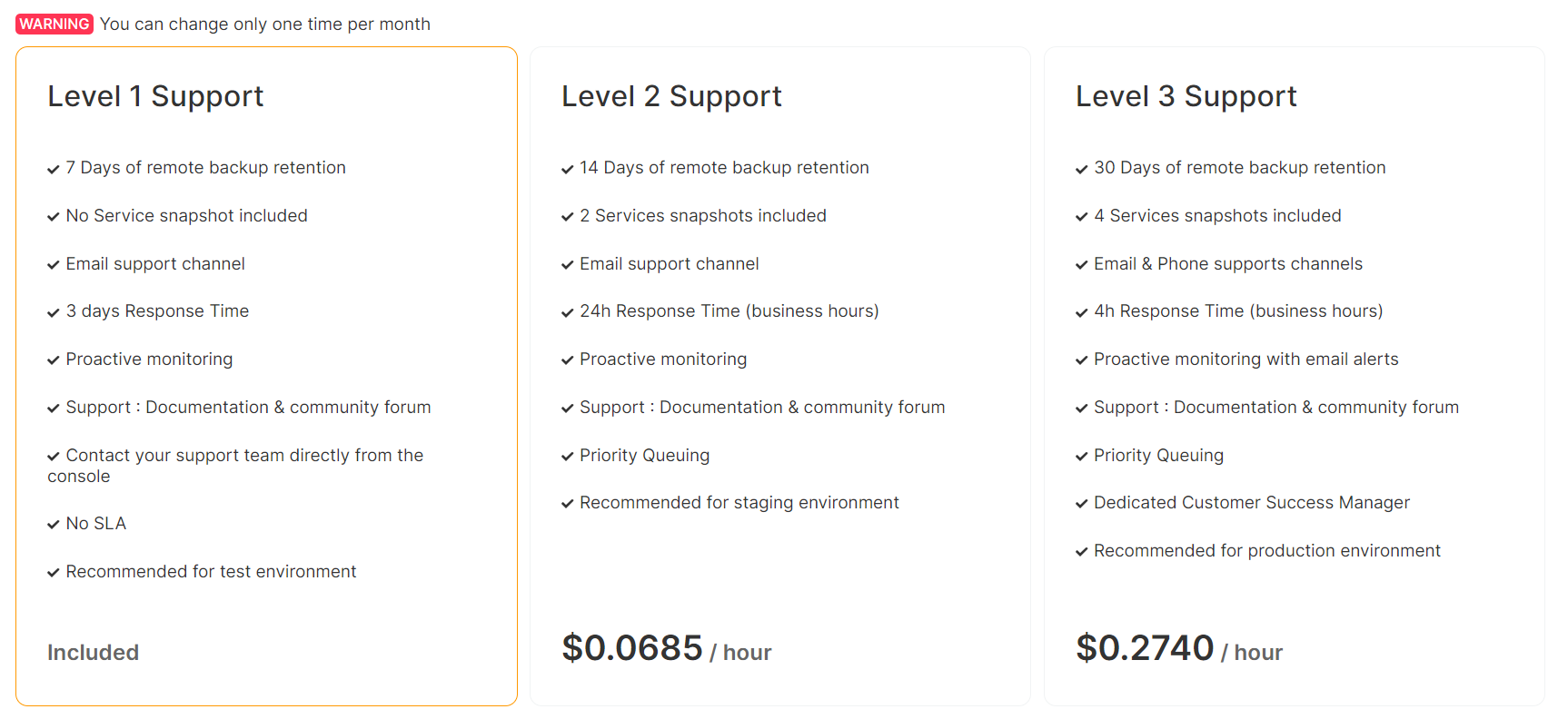Global
Elestio offers comprehensive services, including various support plans, support for multiple database types, and robust backup retention policies.
Support Plans
Elestio providesoffers three levels offlexible support plans tailored to cater tomeet different user needs:needs, ensuring smooth deployment and operation of services.
-
Level 1:
IncludedThis plan is included forfreefree,withandallprovidesdeployed7services,days of remote backup retention, an email support channel, a 3-day response time, proactive monitoring, access to documentation & community forums, and direct console support access. However, this planisdoes not include service snapshots or an SLA (Service Level Agreement), making it most suitable for testing environments.It offers access to guides and community support. -
Level 2: Priced at $0.0685 per hour, offers 14 days of remote backup retention, 2 service
persnapshots,hour,anthisemail support channel, a 24-hour response time (business hours), and proactive monitoring. It also includes priority queuing, ensuring faster support response times compared to Level 1. This plan isidealrecommended forgrowth andstagingenvironments.environmentsItwhereincludeshigherservicereliabilitysnapshotsisand priority queuing.required. -
Level 3: At $0.2740 per
service per hour, this planhour, isrecommendeddesigned for enterprise and productionenvironments.environments,Itofferingoffers30customdaysconfigurations,ofresilienceremote backup retention, 4 service snapshots, access to email & phone support channels, andbackupsatesting.4-hour response time during business hours. Additionally, it includes proactive monitoring with email alerts, priority queuing, and a dedicated Customer Success Manager for personalized assistance.
 Database Types
Database Types
Elestio supports a widecomprehensive arrayrange of databases, each tailored to meet specific application needs:requirements. Below is an overview of the supported databases, categorized for clarity:
Relational Databases:
-
Relational Databases:- MySQL: A widely
usedadopted open-source relational database managementsystem.system (RDBMS) renowned for its reliability, flexibility, and speed. It serves as a foundational component for many web applications and operates seamlessly across various platforms, including Linux, UNIX, and Windows. -
PostgreSQL: An advanced, enterprise-class open-source relational
database.database known for its extensibility and standards compliance. It supports complex queries and offers robust performance, making it suitable for large-scale applications. -
MariaDB: A community-developed fork of MySQL,
offeringMariaDB offers enhancedfeatures.features and improved performance. It ensures high compatibility with MySQL while providing additional storage engines and tools for better scalability. -
TimescaleDB: A time-series database built on PostgreSQL, optimized for complex
queries.queries and high ingest rates. It is designed to handle time-series data efficiently, making it ideal for applications involving monitoring, IoT, and real-time analytics.
- MySQL: A widely
-
NoSQL
DatabasesDatabases::-
Redis: An open-source, in-memory key-value data
store,store used as a database, cache, and message broker. It supports various data structures and offers high performance for read and write operations, suitable for real-time applications. -
KeyDB: A high-performance fork of Redis,
offeringKeyDB introduces multi-threadingcapabilities.capabilities, leading to improved efficiency and throughput. It maintains compatibility with Redis protocols while offering enhanced performance. MongoDB:A document-oriented NoSQL database known for its scalability and flexibility.Cassandra: An open-source NoSQL distributed database management
system.system
-
- ScyllaDB: A distributed NoSQL database designed for high performance and low latency. It is compatible with Apache Cassandra and Amazon DynamoDB, offering high throughput and minimal latency for data-intensive applications.
Specialized DatabasesDatabases::
-
ClickHouse: An open-source, columnar database management system optimized for online analytical
processing.processing (OLAP). It allows for real-time data analysis and is capable of processing large volumes of data quickly. -
Neo4j: A graph database management
system,system optimized for connected data. It efficiently stores and queries data relationships, making it ideal for applications like social networks, recommendation engines, and fraud detection. -
Milvus: A vector database designed for embedding similarity search. It is widely used in AI applications to manage and search large-scale vector data, facilitating tasks like image retrieval, natural language processing, and recommendation systems.
-
Weaviate: An open-source vector search
engine.engine
Backup Retention Policy
Elestio implementsemploys robustcomprehensive backup strategies to safeguardensure the safety and integrity of your data:data. Below is an expanded overview of each backup method, along with their respective retention policies, tailored to different support plans:
-
Manual Local Backups:
QuickThese are user-initiated backupsofstored directly on the local server. They are particularly useful for quickly safeguarding small datasetsstoredorlocally.before making significant changes to applications. While they offer immediate access and rapid restoration, it's important to note that they do not provide redundancy against hardware failures or catastrophic events affecting the local environment. -
Automated Remote Backups (Borg):
BackupsUtilizingsentthe Borg backup system, these backups are automatically transmitted toanothera different datacenter located on the same continent as yourservice,service.ensuringThis approach ensures dataredundancy.redundancy and protection against local failures. The use of Borg allows for efficient, deduplicated, and encrypted backups, optimizing storage usage and enhancing security. -
Automated External Backups (
S3)S3-Compatible Storage):BackupsElestiostoredoffers the capability to store backups in your own S3 bucket, compatible with AWS S3 and any S3-compatible provider. This method provides you with direct ownership and control over your backups, facilitating integration with existing cloud storage solutions and compliance with organizational policies.
Retention periodsPeriods dependBased on yourSupport support plan:Plans:
-
Level 1 (Standard): Backups are retained for 7 days,
retention.offering a basic level of data protection suitable for development or testing environments. -
Level 2 (Premium): Backups are retained for 14 days,
retention.providing an extended safety net ideal for staging environments or applications with moderate data volatility. -
Level 3 (Enterprise): Backups are retained for 30 days,
retention.ensuring long-term data availability and compliance, suitable for critical production environments requiring stringent data protection measures.
For more detailsdetailed information on Elestio's backup strategies and retention policies, consultplease Elestio'srefer to their official backup documentation.
